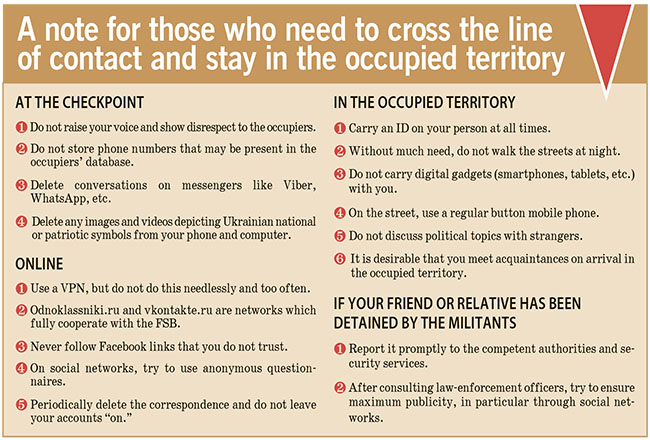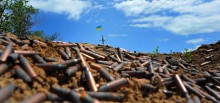In late July 2017, two hostages were released from the Russian thug captivity with the assistance of the Patriot Volunteer Group, the Security Service of Ukraine, diplomats, the OSCE, and the pressure of the international community. They were judge of the Luhansk Regional Court of Appeal Vitalii Rudenko, who had been held for nine months, and Liudmyla Surzhenko, who had been detained by the militants at the Stanytsia Luhanska checkpoint a few weeks earlier. Rudenko was detained at a checkpoint when he was trying to cross the lines to get to the funeral of a relative.
Surzhenko has been disabled since childhood. The thugs accused her of espionage, despite lacking even circumstantial evidence to support the accusations. The woman also drew their attention at the checkpoint just because she did not hear the thugs’ order.
As Ukrainian representative in the humanitarian subgroup of the Trilateral Contact Group Iryna Herashchenko posted on Facebook, “Judge Rudenko and hostage Surzhenko were included in the Minsk lists. The Ukrainian authorities fought for their release from the very moment of illegal detention.” Herashchenko said that the militants demanded that the judge refuse to return to the territories controlled by the Ukrainian authorities. Rudenko himself claims that he was and still remains a Ukrainian patriot. “On the instructions of the president, Surzhenko, who is currently being cared for by doctors and psychologists of the Luhansk region, will have her condition examined next week at the departmental hospital in Verkhnia Street, where other released hostages were rehabilitated,” Herashchenko wrote. “On July 19, when representatives of the occupied districts of the Luhansk region were lying at a meeting of the humanitarian subgroup in Minsk that they did not have any information about the fate of the hearing impaired woman (letters asking to provide information about her fate were sent by the Ukrainian side immediately after the disappearance of Surzhenko), she was held by the so-called ‘Ministry of State Security of the Luhansk People’s Republic,’ tortured for four days, her fingers were clamped with pliers, she remained in chains for several days, and her hands are still numb. Surzhenko was required to provide the access code to her mobile phone and admit to ‘espionage’ and ‘sabotage.’ She was tortured for four days and then illegally detained for two more weeks, so that the marks of beatings and torture go away.” Herashchenko expressed confidence that the enemy did not allow anyone to visit Ukrainian hostages because they wanted to hide the marks of torture.
“IF SUCH A MISFORTUNE HAPPENED, THE DETENTION SHOULD BE PUBLICIZED AS WIDELY AS POSSIBLE”
“It is very difficult to predict the behavior of a madman, because their actions are not subject to logic,” said Yurii Zolkin, head of the Stanytsia Luhanska Raion State Administration. “Therefore, it is very difficult to work out some kind of a clear code of conduct for interacting with the thugs who man checkpoints. A few months ago, we already had a terrible incident when the militants killed a young man who was just making some money on the side carrying goods to the checkpoint near the destroyed bridge. Something was not to the thugs’ liking, and they literally beat him to death with rifle butts on the spot, tied the body to the car and began to pull it along the road, tearing his hand off in the process. The pretext for the detention of Surzhenko, for example, was her not hearing the militant’s order, as her hearing aid’s battery had run out. Because of this, the militants checked her phone, where they found a photo of a man in a T-shirt with the inscription ‘Luhansk is Ukraine’ appearing against the background of the Ukrainian flag. She did not even take the photo, it was the person who sent this photo to her who had done that. That is, she did not carry anything prohibited on her person and did not present any danger to anyone. She just cannot be called a spy.”
“There is even a banner hanging in Luhansk now with words actually threatening people over their statements on social networks,” Zolkin continued. “It is clearly an intimidation campaign targeting the local population forced to live in the occupied territory. As for Surzhenko, I talked to her right after her release. Of course, she needs a period of psychological rehabilitation. Professionals are working with her. I concluded for myself that when it became a scandal and her name was mentioned at the Minsk talks, the case started moving ahead. After all, the militants initially stated that they had no such person in detention at all. They ‘worked’ with her, and then they kept her detained in order to let the marks of their ‘work’ to go away because there were bruises on her body. They then sent her to the Ukrainian side, ‘to her Ukr comrades,’ as they put it, although her mother remained in the occupied territory, and it was the mother who she had intended to visit. Moreover, they sent her across the lines on the condition that she would not reappear in the occupied territory before next day.”
“I am convinced that if such a misfortune happened, the detention should be publicized as widely as possible, since the detained person themselves is immediately deprived of the means of communication, and even requests to inform their relatives are refused,” Zolkin recommended. “For example, we learned about the detention of Surzhenko thanks to the good people who witnessed it. Talking to the militants mostly leads nowhere. Now the only ones who really officially work there in that field and provide help are Red Cross officials. They are not afraid to go to the militants on request of the detainees’ relatives, ask them questions, knock at the doors. But we all understand the low effectiveness of appeals to fake ‘ministers.’ The only rule there is that they release people they want to release, but if they do not want to, detainees are not released.”
“ALWAYS CARRY AN ID ON YOUR PERSON”
While Surzhenko is undergoing a rehabilitation course, Luhansk judge Rudenko shared with journalists the terrible realities of captivity on his release. According to Rudenko, one of the most common types of torture in the occupiers’ prisons is the use of electric power. “At first, they put a sack on one’s head, hands were handcuffed, one was beaten and then had water poured down to make them regain consciousness. Then the worst thing of all started, the electric shock torture or to be more precise, the Alisa device torture; it involved wires joined to the earlobes and fingertips, then a militant gave the command ‘Alisa,’ and the device was switched on, giving the body electric shocks,” the judge recalled.
All these realities of captivity once again prove that Ukraine is dealing not only with “a party to the conflict,” but with an extremely thuggish occupation regime, which has no compunction about engaging in illegal detention of civilians, torture, deprivation of property, etc. The term “law” is only a formality in that territory.
However, the objective reality is that Ukrainians still have to cross the checkpoints and reside in the occupied territories. Of course, not all of them can hold back, so they often express their views frankly, especially on social networks. Given the limited number of captured Ukrainian soldiers, the occupiers focus their attention on defenseless civilians. Therefore, there is a strong need to work out some basic rules of conduct, such as on the use of the Internet (in particular, social networks), and advice on how to act in the event you suspect your relatives or loved ones have been detained. The Day asked volunteer and former Luhansk resident Tetiana Kolesnikova for advice on such rules of conduct.
“The general rules of conduct in the occupied territories have long been written by history itself,” Kolesnikova said. “If you are Ukrainian and live in the occupied districts of the Donbas, or if you decide to come there, you should adhere to some simple rules that, in the event of any misunderstandings with the occupiers, can help you preserve your freedom, and sometimes your life as well. Firstly, always carry an ID on your person. Secondly, without much need, do not walk the streets at night. Thirdly, if you are an active user of the Internet and social networks, never carry digital gadgets (smartphones, tablets, etc.), but use a regular button mobile phone on the street. Fourthly, do not discuss political topics with strangers (be cautious with friends as well). Fifthly, when undergoing an ID check or when crossing the terrorist checkpoints, or during a search, try not to raise your voice and not show open disrespect or hatred of the occupiers.”
Regarding online behavior, Kolesnikova advises: “It is very important to understand that all Internet providers operating in the occupied territories are fully controlled by the terrorists and will provide all information on their first request. Therefore, your online behavior should be as cautious as in real life. Firstly, cybersecurity specialists strongly recommend that pro-Ukrainian inhabitants of the occupied territories use VPNs. Secondly, VPNs too should be used wisely, because if it turns out that a person logs in to the Internet only through VPN servers, it immediately causes suspicion. Therefore, you need to use such a service only if necessary. You must also observe the general safety rules on social networks. Do not post under your real name. Remember that odnoklassniki.ru and vkontakte.ru are fully cooperating with the FSB, and while personal correspondence cannot be tracked on Facebook, one must understand that if someone is already a suspect, they can send a phishing message. Therefore, never follow links sent to you by strangers, and even acquaintances, if you do not understand why they did it.”
“BETTER AVOID DISCUSSING POLITICAL ISSUES”
“A trip to the occupied territory is always a risky proposition, and this must be realized,” Luhansk resident Ivan Petrenko (not his real name), who regularly crosses the line of contact to get to his home, told The Day. “Still, any risks can be managed. Of course, if the militants do intend to limit your freedom, no measure is likely to help. However, all who go there need to take at least basic security precautions. It must be understood that men at the checkpoint will check both documents and personal belongings. In addition, the phone will be checked. Moreover, it will be checked not only for the contents of the memory card (photos, videos, etc.), but also the phone numbers that you called or answered. If at least one of these numbers appears in their database, there may be problems. Once you have crossed the line of contact, you must clearly understand the purpose of your stay there. You should not keep in touch with people you do not know or know poorly or do not trust. Better avoid discussing political issues. It is desirable that you meet your friends there so that in case of your detention someone could report it. At present, the number of citizens’ detentions at the checkpoints has increased. If such a misfortune has already happened, then, in my opinion, it is not enough to inform the relevant Ukrainian authorities of the detention. As practice shows, one needs to ensure maximum publicity, to involve the public.”
Late on July 31, an explosion occurred in downtown Luhansk, damaging the monument to the so-called militiamen. In fact, such explosions have occurred repeatedly, which gives the occupation authorities a reason to talk about Ukrainian sabotage and reconnaissance groups being to blame, and, accordingly, to toughen their security measures. Detaining people on false accusations and suspicions fits the general wave of hysteria well, and therefore, one can predict that such detentions of civilians (given a clear shortage of Ukrainian military prisoners) will only increase.









